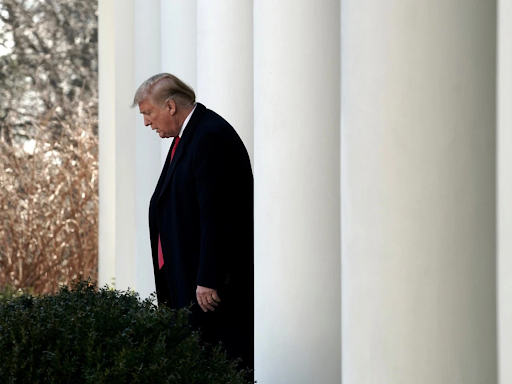
The story of how the impeachment ball began rolling doesn’t start with House Speaker Nancy Pelosi, but seven moderate freshman Democrats. Pelosi’s Sept 24th announcement of support for an impeachment inquiry was kickstarted a day earlier when the 7 Democrats, each with extensive national security experience, published an OpEd in the Washington Post calling for impeachment hearings.
But first, a quick refresher on the basis of these new calls for impeachment. On July 25th, 2019, during a phone call with the newly elected Ukrainian President Volodymyr Zelensky, President Trump pressured Mr. Zelensky to investigate Joe Biden’s son Hunter Biden’s business dealings in Ukraine. The President’s personal lawyer, Rudy Guliani, also met with multiple Ukrainian officials seeking an investigation into the Bidens. Days before the call with Mr. Zelensky, President Trump froze nearly $400 million in military aid to Ukraine. He has since unfrozen this military aid amid newfound calls for impeachment.
Hunter was on the board of Burisma Holdings, a Ukrainian oil and gas conglomerate. Meanwhile Joe Biden, as Vice President, is leading an anti-corruption crusade in Ukraine where he is pushing for the removal of Viktor Shokin, Ukraine’s top prosecutor. Mr. Shokin was keen on investigating Burisma Holdings at the time. Contrary to some commentary, Biden was not the only one calling for Mr. Shokin’s ousting. Per a New York Times 2016 article on the topic:
“Christine Lagarde, the managing director of the International Monetary Fund, which props up Ukraine financially, said last month that progress was so slow in fighting corruption that “it’s hard to see how the I.M.F.-supported program can continue.”
(It should also be noted that Hunter Biden joined Burisma Holdings while it was already under investigation, not before.) The investigation into Burisma likely had little to do with the Bidens, if anything at all. None of the White House Ukraine talking points, which the White House accidentally emailed to House Democrats, have been corroborated.
On August 12th, a whistleblower complaint regarding the July 25th call was filed to the Inspector General of the Intelligence Community by a CIA officer previously assigned to the White House. The Inspector General, Michael Atkinson, deemed the complaint urgent and credible and sent it up the ladder to the acting Director of National Intelligence, Joseph Maguire. Maguire, as per U.S. Code § 3033, is then supposed to forward the complaint to the House and Senate intelligence committees within a week. He did not. But the House Intelligence Committee was already notified of the complaint and became suspicious when they did not receive it—a rarity in whistleblower complaints. Fast forward a month, and a majority of the House supports the impeachment inquiry as it seems more likely by the day that this will not blow over like the typical Trump scandal.
There is debate over what an official impeachment inquiry means, or if anything has materially changed other than rhetoric. House Judiciary Chairman Jerry Nadler all-but-publically supported impeachment prior to Pelosi’s announcement and was already investigating the White House under those guidelines. Pelosi called for six House committees to proceed with investigations under the “umbrella of an impeachment inquiry.” Some of which, like Judiciary, were already undergoing investigations into the White House. Calls have been ramping up by the day as evidence of an effort to hide the call from Congress and the public have arisen, including placing the transcript memo in a secure file meant for classified contents. The White House’s willingness to release the memo in full when prompted to is evidence that it should have never been in this secure file in the first place.
There’s a lot of misinformation and confusion out there about the basis for impeachment and the impeachment process. Contrary to House Republican’s statements, you do not need to bring a resolution to the floor to open an impeachment inquiry, as happened with President Clinton’s impeachment. And contrary to various Twitter commentary, there is support for an impeachment inquiry in the House but no one can be sure what the count to actually impeach is—mainly because no one even knows what the articles of impeachment will contain. Will it be hyperfocused on Ukraine? Will it mention Russia? What about the emoluments clause, campaign finance violations, obstruction of justice, or even just mental fitness?
I ask you to be wary of absolutes and pontifications on impeachment, at least for now. Very few people have real insights into the inner machinations of the House’s inquiry, and absolutely no one knows the political ramifications of impeachment (no matter how many bad takes are made). Polls vary wildly based on the wording implications of impeachment vs. removal and all that is in-between. It’s been a winding road to get here, but the show has only just begun.
Kevin Hanley
Kevin Hanley is a copy editor for In The Zeitgeist and senior in CAS majoring in politics. He has spent the spring and summer of 2019 interning in Washington, D.C. on the Hill and for Devine Mulvey Longabaugh, a democratic media consulting firm. His writing has been published in the NYU Undergraduate Law Review and the NYU Review and Debate along with In the Zeitgeist.



